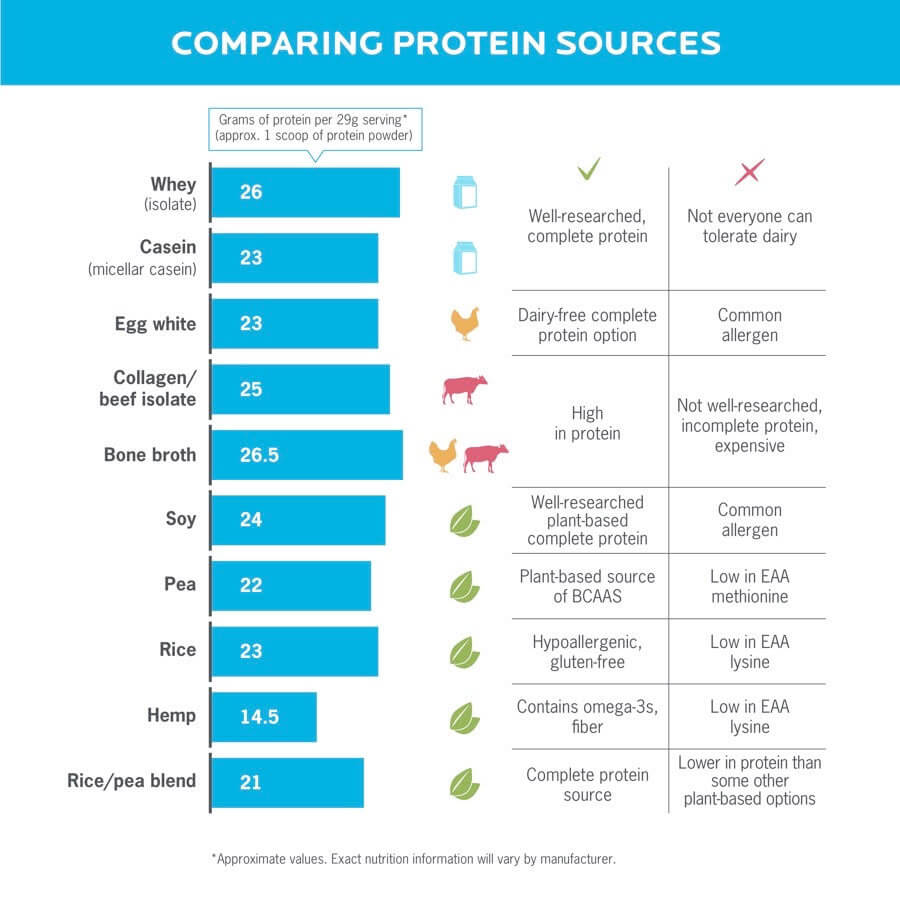Proteins are the building blocks of life. We need proteins to produce molecules in our body like enzymes, hormones, neurotransmitters, and antibodies. Protein also helps to replace old cells, helps with growth and repair of new cells, and transports various substances throughout the body. Consuming protein also helps increase the level of a hormone called glucagon. To keep it simple, glucagon is a hormone that can help control body fat.
Protein also helps to “free” fatty acids from adipose tissue. In other words, adequate protein helps get fuel for our cells via our body fat AKA we’re leaner!
Unlike extra fat(which some of us are trying to get rid of), we don’t store a lot of extra proteins. They are always getting used, recycled and secreted. This means we need to get an adequate, continuous amount of them into our diets. If not, our bodies will take protein from other areas that we need, like our muscles.
This is a super simple and basic understanding of what protein does within us. While most of us are mostly concerned with how we look, it’s important to note that protein does a lot for us internally as well.
Protein is key for putting on lean muscle mass. The more protein you have in your muscles, the bigger and stronger you can get. Now, before I go any further: for those of you who are afraid of getting “too big/bulky”, this doesn’t mean eating more protein is going to bulk you up overnight.
Protein is also great for helping you to lose body fat, for a few reasons.
For one, when you eat more protein, you tend to feel fuller longer. This will help you to naturally eat less(combined with the sweet awareness habits we built up over the last month). Protein also makes your body work harder to digest it, more so than fat or carb sources of food.
For example, say you eat 100 calories of protein, you’ll only use about 70 calories of it. The other 30 calories go towards actually digesting it. Lastly, sufficient protein intake helps insure you hang onto lean muscle tissue while you’re losing fat. When you’re in a calorie deficit(eating less than you need), your body tries to throw out everything-fat, muscle, hormones, bones etc.- aka things that you might need. If you’re getting in enough protein, however, your body will hang onto your muscle rather than trying to get rid of it.
Protein in your diets can also help you to lower blood pressure, improve blood cholesterol, improve glucose regulation, help you recover from injury or sickness and improves many other health metrics.
PROTEIN MYTHS
I get asked by clients all the time “isn’t too much protein bad for me?” There are a lot of health concerns in regards to protein. I’m going to go over the main ones today and hopefully ease some of your minds.
Concern: high protein causes kidney damage.
This one began with a misunderstanding of WHY doctors tell people with poorly functioning kidneys(usually a pre existing disease) to eat a lower protein diet. There’s a big difference between avoiding protein when your kidneys are already damaged and protein actually damaging healthy kidneys.
It’s the difference between squatting with a healthy leg and squatting with a broken leg. If you had a broken leg, your doctor would likely recommend you not to squat. Duh. This doesn’t mean that squatting LEADS TO broken legs.
There is evidence that your kidneys have to work harder when you’re on a high protein diet(just like your legs have to work harder when you squat). But there is no evidence that suggests that higher protein diets lead to kidney damage in healthy adults.
Concern: high protein causes liver damage.
Same idea as the kidney. The liver is a major processing organ. People with pre existing liver issues should likely eat less protein, but protein in and of itself does not cause these issues.
Concern: high protein causes osteoporosis
There was a study that showed eating more protein without also upping your fruit and vegetable intake will cause you to lose more calcium in your pee. This led people to believe that more protein=less calcium in bones, and thus led to weaker bones. Again, there is no evidence that supports that protein causes osteoporosis.
If anything, not getting in enough protein has been shown to lead to bone loss. As we talked about the other day, protein is a building block of ‘us’, and this includes our bones.
Concern: high protein causes cancer
For this claim, there isn’t enough evidence yet to either confirm or deny this concern. There was basically a study that asked people how much protein people ate, and then tracked how often people got cancer. This study did show a correlation between protein and cancer rates.
However, this study didn’t take into account things like where you got your protein from, how you cooked it, the quality of your protein etc. Also, studies that rely on people recalling what they ate are deemed basically worthless, since we aren’t very good at recalling accurate intake based off memory alone.
The evidence here is pretty limited, and there’s a lot of other factors involved.
Concern: high protein causes heart disease
Eating animal based sources of protein are linked to an increased risk of heart disease, where plant based sources are not. This suggests that where you get your protein from is more important than how much you actually eat.
However, this study was based off a questionnaire, which isn’t the most accurate way to gather data. Also, it was not tested to see if all animals cause the same issue. For example, is seafood just as big a culprit as red meat?
There’s limited evidence for this concern, and protein source is a major factor that isn’t accounted for.
HOW MUCH PROTEIN SHOULD I EAT?
For the majority of my clients, I don’t have them using food scales or measuring cups to weigh out their food. Lets be honest, nobody wants to take a food scale with them everywhere. I usually like to have my clients use their hands as a reference, and for protein they would use their palm as a portion guide.
There’s a few reasons why I like to start people off using their hands for a portion guide.
- Your hands are portable. They go everywhere you go. Whether you’re in the comfort of your home, at a restaurant or visiting a family member for dinner, your hands are accessible and you can use them as a reference guide.
- They are customized to you. If you’re a bigger person, you likely have bigger hands, and you need bigger portions. If you’re a smaller person, you likely have smaller hands and need smaller portions.
- 1-2 palm-sized portions gives you a healthy amount of food, and ensures we cover any deficiencies you may have. Depending on the size of your hands, 1 palm of protein would equate to about 10-20 grams of protein. If you’re getting in at least 4 servings per day, plus whatever protein you get from other food sources, you’ll be sure you aren’t lacking in the protein department.
- Numbers-wise, I normally recommend .8-1.2 grams of protein per pound of bodyweight
PROTEIN POWDERS
Protein powders can be great if you don’t have the time to get in enough protein from whole, minimally processed sources. It’s often super easy to just make a protein shake and go! Honestly, how hard is it to eat a meal out of containers as you’re racing down the road to get to work or get the kids(not that you guys would EVER eat in your cars)
Most protein powders have strengths and weaknesses…

Consider what you hope to accomplish when using a protein powder before making your selection. Establish digestibility before choosing a protein source. (You may have to experiment.) The method in which the protein powder is used will also influence your selection (e.g., shakes, puddings, bars, pancakes, etc). You get what you pay for. By choosing a “cheap” protein powder, you’re likely to get higher amounts of lactose, fat, fillers, and so on not removed during the isolation process. If you regularly use protein powders, rotating sources every 2-4 weeks may be a helpful guard against building intolerances.
I will always recommend trying to get your protein from whole, minimally processed food sources. But if you find you simply can’t eat that much protein, or you’re simply on the go and need a quick and convenient option, protein powders are a great way to go!
CLOSING THOUGHTS
There’s a lot of info out there about protein, and it can honestly be pretty overwhelming. When in doubt, talk to a reputable and trusted health coach, like one of the staff at Evolve Health and Performance!
I hope you guys all have an awesome weekend! Never settle, stay evolving!
Love always,
Coach Ian
References
Antonio J, Ellerbroek A, Silver T, Vargas L, Peacock C. The effects of a high protein diet on indices of health and body composition—a crossover trial in resistance-trained men. J Int Soc Sports Nutr. 2016 Jan 16;13:3.
Baum JI, Kim IY, Wolfe RR. Protein Consumption and the Elderly: What Is the Optimal Level of Intake? Nutrients. 2016 Jun 8;8(6). pii: E359
Levine ME, Suarez JA, Brandhorst S, Balasubramanian P, Cheng CW, Madia F, Fontana L, Mirisola MG, Guevara-Aguirre J, Wan J, Passarino G, Kennedy BK, Wei M, Cohen P, Crimmins EM, Longo VD. Low protein intake is associated with a major reduction in IGF-1, cancer, and overall mortality in the 65 and younger but not older population. Cell Metab. 2014 Mar 4;19(3):407-17.
Manninen AH. Are high-protein diets safe for kidney function? J Am Diet Assoc. 2007 Oct;107(10):1722.
Song M, Fung TT, Hu FB, Willett WC, Longo VD, Chan AT, Giovannucci EL.Association of Animal and Plant Protein Intake With All-Cause and Cause-Specific Mortality. JAMA Intern Med. 2016 Aug 1. doi: 10.1001/jamainternmed.2016.4182 [Epub ahead of print]
